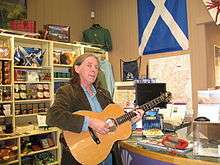Dougie MacLean
| Dougie MacLean | |
|---|---|
|
Dougie MacLean in September 2011 | |
| Background information | |
| Born |
27 September 1954 Dunblane, Perthshire, Scotland |
| Occupation(s) | Singer, songwriter, composer, musician |
| Instruments | Guitar, Violin, Mandola, Viola, Bouzouki, Harmonica, Banjo, Bass |
| Associated acts | The Tannahill Weavers, Silly Wizard |
| Website |
www |
Dougie MacLean, OBE (born 27 September 1954 in Dunblane)[1] is a Scottish singer-songwriter, composer, multi-instrumentalist and record producer. Described by AllMusic as "one of Scotland's premier singer-songwriters",[2] MacLean has performed under both his own name, and as part of multiple folk bands, since the mid 1970s.
MacLean's most famous pieces include "The Gael" (1990), which became the main theme to 1992 film The Last of the Mohicans, and "Caledonia", from his first album (1978); the latter has been called Scotland's "unofficial" national anthem.[3] He also served as music director for TAG Theatre Company's 1993 production of A Scots Quair,[2] releasing his contributions on the Sunset Song LP (1994). MacLean's songs have been recorded by many artists including Ronan Keating, Paolo Nutini, Amy Macdonald, Kathy Mattea, Frankie Miller, Cara Dillon, and Mary Black,[3] who covered "Turning Away" (1991) for the soundtrack of the 2001 film Angel Eyes.
MacLean was the subject of the 1993 BBC documentary film The Land: The Songs of Dougie MacLean. Aside from his career as a touring singer-songwriter, MacLean founded the Dunkeld Records label and recording studio with his wife Jennifer in 1983.[2]
Origins
To support himself in the 1970s, MacLean was a driver for Doc Watson and Merle Watson during their tour around Europe.[4] He maintained a friendship afterward and has appeared at Merlefest.[5]
His career started with a traditional band, The Tannahill Weavers, in 1976. In the early 1980s, he was briefly part of Silly Wizard.
Solo career
His solo career started in 1981 and since then he has recorded numerous albums. He plays multiple instruments, including guitar, violin, mandola, viola, bouzouki, banjo and bass as well as being a singer and composer.[6]
MacLean has organised and performed in the Perthshire Amber festival, Birnam & Dunkeld, alongside multiple performances at Celtic Connections, Glasgow.
Awards
In 2011, MacLean was invested as an Officer of the Most Excellent Order of the British Empire (OBE).[7]
In 2013, MacLean was awarded the BBC Radio 2 Folk Award for Lifetime Achievement for Contribution to Songwriting. The award was presented by First Minister Alex Salmond at Glasgow Royal Concert Hall.[8][9][10][11]
Discography
Studio
- Are Ye Sleeping Maggie (1976) (with The Tannahill Weavers)
- Caledonia (1978) (as Alan Roberts & Dougie MacLean)
- CRM (1979) (as Alex Campbell, Alan Roberts & Dougie MacLean)
- Snaigow (1980)
- On A Wing and a Prayer (1981)
- Craigie Dhu (1982)
- Butterstone (1983)
- Fiddle (1984)
- Singing Land (1985)
- Real Estate (1988)
- Whitewash (1990)
- The Search (1990)
- Indigenous (1991)
- Sunset Song (1993)
- Marching Mystery (1994)
- Tribute (1996)
- Riof (1997)
- Perthshire Amber (2000)
- Who Am I (2002)
- Early (2003)
- Inside The Thunder (2006)
- Muir of Gormack (2007)
- Resolution (2010)
- Till Tomorrow (2014)
- Caledonia Cantata (2015)
- New Tomorrow (2017)
Instrumental
- Fiddle (1984)
- The Search (1990)
- Sunset Song (1994)
Live
- Live: From The Ends Of The Earth (2000)
Video
- The Land (1996)
- Live At Perthshire Amber (2006)
- Songmaker (2010)
Compilations
- The Dougie Maclean Collection (1995)
- The Plant Life Years (1995)
- The Essential Dougie MacLean (2007)
- The Essential Too (2013)
References
- ↑ "Albums by Dougie MacLean". Rate Your Music. Retrieved 6 April 2013.
- 1 2 3 Harris, Craig. "Dougie MacLean: Biography". Allmusic. Retrieved 8 April 2012.
- 1 2 "Caledonia Best Bring Together Dougie Maclean and AMWWF for New Version of 'Caledonia'". PR Newswire. 15 February 2013. Retrieved 7 July 2013.
- ↑ "From Doc Watson to lifetime folk award, Dougie MacLean sings on". Reuters. 30 January 2013. Retrieved 5 February 2013.
- ↑ "2013 Merlefest Artist list".
- ↑ Emblen, Frank (23 February 1986). New Jersey Guide. "The New York Times". Accessed on 14 August 2007.
- ↑ "'Caledonia' folk writer receives OBE". BBC. 31 December 2010. Retrieved 4 February 2011.
- ↑ "BBC Radio 2 Folk Awards recognises Scots legends". Scotsman. 31 January 2013. Retrieved 5 February 2013.
- ↑ "Dougie Maclean celebrates Folk Award with star-studded Caledonia rendition". Daily Record and Sunday Mail. 1 February 2013. Retrieved 5 February 2013.
- ↑ "BBC2 Folk Awards 2013 Winners". Retrieved 5 February 2013.
- ↑ "BBC2 Folk Awards 2013 Winners". Retrieved 5 February 2013.
